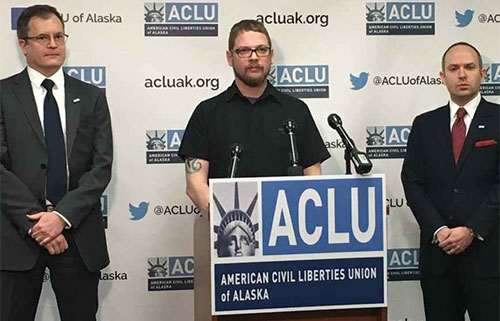
Two Residents Sue Kenai Borough over Its Unconstitutional Invocation Policy That Limits Who May Give Invocations
December 15, 2016
Thursday AM
(SitNews) Anchorage, Alaska - Yesterday, the American Civil Liberties Union of Alaska filed a lawsuit against the Kenai Peninsula Borough on behalf of Lance Hunt and Iris Fontana, two Borough residents who are standing up to challenge the Kenai Borough Assembly’s unconstitutional restrictions on who may offer invocations at the beginning of the Assembly’s public meetings.

From left to right: ACLU staff attorney Eric Glatt, plaintiff Lance Hunt and ACLU of Alaska Executive Director Joshua Decker.
Photo courtesy
ACLU of Alaska
Lance Hunt and Iris Fontana each gave separate invocations this summer, during a period when the Assembly allowed invocations on a first-come, first-served basis. Lance, an atheist, invoked the Assembly members’ common humanity to solemnize its July 26 meeting: he encouraged the Assembly members to overlook differences and to have empathy for one’s neighbors. Iris, who read an invocation from The Satanic Temple to solemnize the Assembly’s August 9 meeting, encouraged the Assembly members to use innate, human reason to guide their deliberations. In a direct response to Lance and Iris’s invocations—and to prevent them and other community members from giving similar invocations in the future—the Assembly adopted unconstitutional and discriminatory restrictions that limit who may publicly solemnize Kenai Peninsula Borough Assembly meetings. The restrictions limit that honor to members of religious associations that are established in and regularly meet in the Kenai Peninsula Borough.
“I’ve lived on the Kenai since 1994,” said Plaintiff Lance Hunt. “I’m involved in my community and I try to make the Kenai a better place for my neighbors. My July invocation called on the members of the Borough Assembly to be good to everyone, to recognize our common humanity, and to have empathy for our neighbors. Just because I don’t belong to a religious association, I don’t understand why the Assembly felt the need to prevent me from offering a similar invocation in the future.”
“I grew up in Ketchikan and moved to the Kenai six years ago and plan to stay for the rest of my life,” said Plaintiff Iris Fontana. “As a psychology and anthropology major at the Kenai Peninsula College, I’m learning how to help people. As I study the world’s cultures and societies, I’m struck by how alike we all are. In August, I tried to inspire the Assembly members to use our common, innate human gifts of logic and reason as they deliberate on what’s best for me and my neighbors; last month, they told me that I could not give another invocation.”
In the seminal 2014 U.S. Supreme Court decision on invocations, Town of Greece, N.Y. v. Galloway, Justice Samuel Alito noted that since the start of the First Continental Congress in September 1774—before the United States had even declared its independence—“one of [the] purposes, and presumably one of [the] effects” of invocations “was not to divide, but to unite.” Justice Kennedy explained that once the government “invites prayer into the public sphere, government must permit a prayer giver to address his or her own God or gods as conscience dictates, unfettered by what an administrator or judge considers to be nonsectarian.”
“This is why we sued today,” said Eric Glatt, staff attorney at the ACLU of Alaska. “Rather than picking invocation speakers in a fair and neutral manner, such as first-come, first-served, the Borough has decreed that some speakers are acceptable and others - like our clients Lance and Iris - are not. This violates the Constitution’s guarantees of equal protection, freedom of speech, freedom of association, and not favoring one religious practice over another.”
This lawsuit comes after the ACLU of Alaska spent two months asking and encouraging the Kenai Peninsula Borough to abandon its unconstitutional restrictions.
“We sent two letters, we traveled to three Assembly meetings, and we clearly explained that the Borough could not have this policy to exclude people like our clients, Lance and Iris, from offering invocations,” said Joshua A. Decker, executive director of the ACLU of Alaska.
Decker said, “But, in spite of Borough Mayor Navarre’s veto, the Assembly overrode it and doubled-down on this unconstitutional discrimination. Even though the Borough refused to do the right thing, it’s the job of the ACLU to protect the Bill of Rights, which is why, to protect the constitutional rights of Lance, Iris, and everyone else, we had to sue today.”
Editing by Mary Kauffman, SitNews
Source of News:
American Civil Liberties Union of Alaska
www.acluak.org
Representations of fact and opinions in comments posted are solely those of the individual posters and do not represent the opinions of Sitnews.
Submit A Letter to SitNews
Contact the Editor
SitNews ©2016
Stories In The News
Ketchikan, Alaska
|
Articles &
photographs that appear in SitNews may be protected by copyright
and may not be reprinted without written permission from and
payment of any required fees to the proper sources.
E-mail your news &
photos to editor@sitnews.us
Photographers choosing to submit photographs for publication to SitNews are in doing so granting their permission for publication and for archiving. SitNews does not sell photographs. All requests for purchasing a photograph will be emailed to the photographer.
|
|

